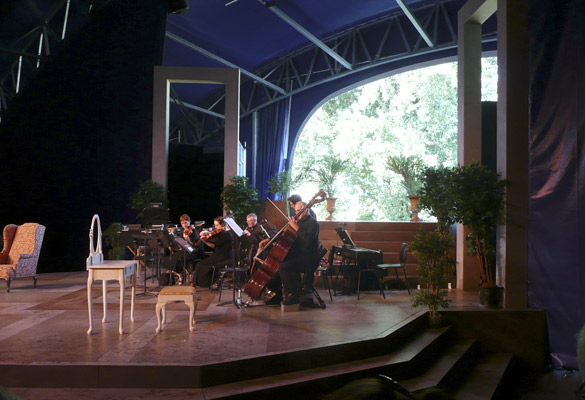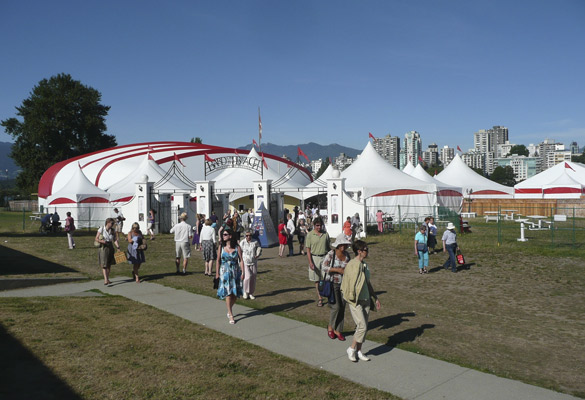Figaro on the beach

Yesterday afternoon, a Labour Day holiday here in Canada, we had the pleasure of seeing and hearing a delightful and well-done performance of Mozart’s The Marriage of Figaro on the mainstage of Bard on the Beach. The energetic young stars of the UBC Opera Ensemble, from University of British Columbia’s Music School impressed us with their professionalism, well-trained and beautiful voices, their acting skills and the lovely costumes on this small stage with minimal props, shared with the Vancouver Opera orchestra.
Over the years, we’ve attended some of the Shakespearean plays here. The mainstage tent has an opening behind the stage overlooking English Bay and the North Shore mountains and sky. The Bard on the Beach Shakespearean Festival has become a well-loved and attended Vancouver cultural site every summer since it’s founding in 1990, by the amazing actor and director Christopher Gaze. This time Gaze was the host for Figaro, stepping in between scenes with quick, entertaining and helpful synopses of each scene, as they were sung in Italian.
I’m only sorry we were not allowed to take photos inside to show you, though I sneaked the top one just as some of the orchestra players began the warmup. Below is a view of the Bard on the Beach site – what a beautiful day it was (though hot inside the tent!). If you are ever in Vancouver in the summer and you love Shakespeare, this is the place to enjoy the Bard, along with certain special events such as Figaro!

September 6, 2011 in Canada and BC, Culture, Music by Marja-Leena
Interesting stage (thank you for the clandestine shot) Is it open in the back or am I just imagining things? Sounds like a wonderful performance.
Shakespeare By The Sea has been a summer weekend tradition at Point Pleasant Park since 1994. One afternoon we walked up to the semi-natural amphitheater to watch their first dress rehearsal for Robin Hood. I know. I wasn’t aware the Bard had written that either but they have to perform material that will get parents to bring their kids. The actors were a pretty enthusiastic group but not quite at the level of the show you describe. They have no nice tents either.
Rouchswalwe, yes, it is open at the back, and the actors use it for some entrances and exits besides the side ones. It’s a wonderful view when you sit in the middle, sometimes even with a moon at night. I remember during one play we saw years ago the audience was treated to the sight of a low flying plane, noise and all during a strangely opportune moment, which made everyone laugh, including the actors.
In fact, you can see the view in the trailer for As You Like It.
Susan, an amphiteatre sounds cooler than a tent on a hot afternoon or evening, though rain would not be fun! It’s good to introduce children to theatre with lighter material. I think Bard on the Beach does offer some children’s workshops and programming as well. We’re certainly lucky with the high caliber here.
yes, the fellow behind the bard does a lot of theatre with homeschoolers, i wish we’d had a chance to study with him! it looks incredible in there, i’ve never been. x
Elisa, I did not know that but I’m not surprised – he’s so energetic and generous with his time. Next summer, we should go together to a performance at Bard on the Beach, and also check out something for the girls.
How I wish I had made the effort to come up to Vancouver to attend that performance. Perhaps I’ll get to the opera this winter.
Anne, with all your other travels, I’m not surprised. Perhaps we should make a date at the opera together. We don’t go often enough.
Nice to see Vancouver looking warm and dry! But I know it may be a little too warm for you.
Hattie, I guess you wish you’d had this weather when you were here earlier this summer. Summer came late and isn’t finished yet.
What a romantic sight. Must be wonderful to start a play in light and go into dusk and then see the moon soar up.
Marly, oh yes it is quite a romantic sight when it all aligns right, especially for a love scene.
But who got to sing Cherubino? One of WA’s great little testers: you need a soprano who looks about seventeen yet has the technique that can only be acquired over twenty years. The students could no doubt do the youth bit, the other half is more difficult. In a Masterclass the somewhat controversial singer (politics and all that) Elizabeth Schwarzkopf had just reduced an aspirant twenty-year-old to tears and justified it by saying Cherubino has very little to sing and therefore she has to be perfect. “And zat is ze Jairman vay,” she more or less implied. The audience tended to disagree and clapped the tear-stained girl quite vigorously for trying; and ES in her inimitably sympathetic way simply shrugged her shoulders, snorted and implied yet again the audience were fools. With sublime music there are no points for trying. An elegant little moral conundrum.
BB, the role of Cherubino was done extremely well by a young woman, not exactly seventeen though. All the cast were I’d guess in their 20’s and 30’s, well trained and with excellent voices, though I’m no music critic. UBC’s School of Music has sent out some world class singers like Ben Heppner and many others. You relate an interesting story, which unfortunately puts E.S. in a bad light in my eyes as another diva. Why is the opera world so full of them?
(P.S. Who/what is WA?)
WA – Wolfgang Amadeus (Mozart). ES lived where she didn’t ought to have during WW2. She had a brilliant voice (her Strauss’s Four Last Songs continues to be virtually definitive nearly fifty years after it was recorded. I have the recording, once on LP now transferred to CD.) But she herself was comically the stereotype German (remember, I am very pro-German) totally lacking in human sensitivity and – funnily – no sense of humour. The Masterclass I refer to showed off these negative qualities rather cruelly. She lived in Britain after the war, having married an English impresario who helped further her career. When there were calls for her earlier life to be investigated she moved to Switzerland. Alas music is an emotional state of mind and when I listen to the FLS I am never unaware of these matters.
Divas? The word now tends to be avoided. Once it meant a leading woman singer, now it tends to imply she’s misbehaving herself. Consider the paradox of Cecilia Bartholi. She has resurrected a number of forgotten Vivaldi operas which fit her fast flexible voice to perfection. A good thing. Yet when she was singing Mozart at the Met she insisted on re-introducing two or three arias into the opera that Mozart himself had dropped. This led to an argument with the director, Jonathan Miller, whom the Met had to fire. (No one ever fires the lead singer.) I have heard her interviewed and she has – let us say – her certainties. Perhaps this sort of behaviour should be ignored as a gesture towards feminism.
Cherubino requires an almost impossible combination of skills. He (sung of course by a she) is a randy little character who has dangerously fallen in love with the married Countess and pours out his heart in one of those sublime arias (Non so più) which WA seems to toss off and which – heartbreakingly for us the audience – is only allowed to endure for a couple of minutes or so. There’s all this risqué stuff about his palpitating innards and it’s done at breakneck speed to get across the impulsiveness of his youth. There’s a tendency for the musical line to get broken up due to the demands on the singer’s technique and yet – ah cruel WA – it’s all supposed to be legato and effortless. In a sense you sit outside the opera at this point and just listen to a separate act. Just one of those prices one pays when exposed to – IMHO – the greates opera ever written. I only asked.
BB, thank you, this is all fascinating. My knowledge of music and this history comes far short of yours. I love opera but I’ve not studied it in any depth. You have described two strong women with gorgeous voices. The ES story is rather sad because of the war I think.
I’m more familiar with Bartoli who has done a lot of work bringing back forgotten works. Yes, their strength used to be called diva-like but I think of it as meaning high-handed, selfish, cruel to others (as ES seemed), rather than standing up for their principles and knowledge of their material. Hmmm, I wonder what is the term for a male ‘diva’, if there is even such a thing? Ach, artists are a temperamental lot, including the composers, are they not? Imperfect like the rest of us, really.
And thanks for the additional background on Cherubino’s role. In light of what you’ve told me, I still think, to my less-trained ear the singer did quite well and the audience showed their appreciation for that aria with quite a round of applause.